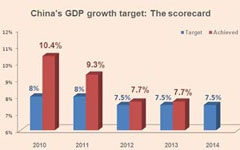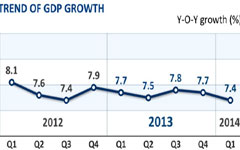It would be wrong to interpret the lackluster economic figures in the first quarter as an indication of crisis
Anyone "looking for a crisis" will interpret China's lackluster economic figures for the first quarter, such as its 7.4 percent growth in GDP, decline in exports and a slump in the producer price index, as signs of the further worsening of its economic conditions and an excuse for a new round of stimulus measures.
|
|

|
However, five years after the outbreak of the global financial crisis, an objective judgment of China's current economic situation based on the economic data first needs to realize that short-term figures herald different economic trends at different times. If China's just unveiled first-quarter economic data signal ongoing economic deterioration, they would justify the adoption of some stimulus policies. However, if they are merely normal and regular economic fluctuations during a period of structural transition, then they should not be interpreted as signifying a crisis. Any large-scale stimulus packages adopted at this time would sabotage the normal trajectory of the country's economic development, as it is not a time of crisis.
Anyone looking at China's first-quarter economic figures with a "crisis mentality" will no doubt jump to the conclusion that the world's second-largest economy is stalling and runs the risk of a hard landing. Such a judgment will defend the shift to an easy monetary policy, such as to lower banks' deposit reserve ratio, and further misjudgments may be encouraged. Only with a non-crisis perspective, can one make the objective and accurate judgment that China's economy is entering a new stage of steady growth.
Owing to the changes in the economic pattern at home and abroad, especially the change in China's long-held comparative advantage in labor, the conditions for China's high-speed economic growth over the past decades have fundamentally changed and its economic growth will slow from the breakneck speed of previous decades to the 7 to 8 percent range. This moderately slowed economic growth is normal and reasonable and shows the economy's intrinsic stability. After decades of high-paced growth, a 7 to 8 percent growth rate is the inherent range for China's economic growth in the new situation, which can be seen from the 7.6 percent growth of 2102 and the 7.7 percent economic growth of 2013. Therefore, the 7.4 percent GDP growth in the first quarter is within the range that is reasonable for the economy and there is no possibility of a steep economic slowdown or a hard landing.













